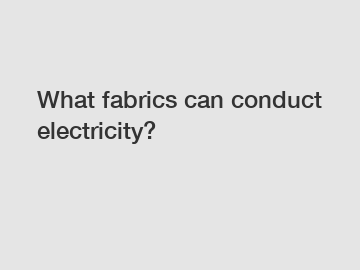What fabrics can conduct electricity?
What fabrics can conduct electricity? Conductive fabrics are materials that have the ability to carry an electrical current. They are used for a variety of applications, from wearable technology to electromechanical devices. In this article, we will explore the types of fabrics that can conduct electricity, discuss the scientific principles behind their conductivity, and highlight the significance and impact of these fabrics in various industries.
There are several fabrics that possess electrical conductivity. The most common conductive fabric is made from a blend of metal and fibers, such as silver or copper. These metals have high electrical conductivity, allowing them to carry current efficiently. By blending them with fibers, conductive fabrics are formed, which can be further woven or knitted into various forms. Other conductive fabrics are made by coating or printing conductive materials onto non-conductive fabrics.
The conductivity of fabrics depends on the presence of mobile charge carriers, which are responsible for the movement of electric charges. In metals, these mobile charge carriers are free electrons that can move easily through the material. When a voltage is applied, the free electrons flow and create an electric current. This is why metals, such as silver and copper, have excellent electrical conductivity and are widely used in conductive fabrics.

In addition to metal-based fabrics, there are also conductive textiles that utilize carbon-based materials. Carbon fibers or nanotubes can be incorporated into fabrics, providing a conductive path for the flow of electricity. These carbon-based materials have unique electrical properties, such as high tensile strength and flexibility, making them suitable for applications that require durability and stretchability.
The significance of conductive fabrics lies in their ability to enable the integration of electronics into textiles. With the advancement of wearable technology, conductive fabrics play a crucial role in creating smart garments and accessories. They allow for the seamless integration of sensors, actuators, and other electronic components into clothing, revolutionizing the way we interact with our clothes. For example, conductive fabrics can be used to create garments that monitor vital signs, track movement, or even generate electricity from body heat.
Moreover, conductive fabrics have applications beyond wearable technology. They are used in the aerospace industry to create antennas embedded within fabrics, enhancing communication capabilities in aircraft. In the field of medical devices, conductive fabrics are employed in electrode pads for electrocardiograms and neural monitoring. Furthermore, conductive fabrics are utilized in the automotive industry for heating elements in seats or as touch-sensitive surfaces in car interiors.
In conclusion, a variety of fabrics can conduct electricity, including metal-based fabrics like silver and copper blends, as well as carbon-based fabrics incorporating carbon fibers or nanotubes. The conductivity of these fabrics stems from the presence of mobile charge carriers, enabling the flow of electric charges. The significance of conductive fabrics lies in their ability to integrate electronics into textiles, enabling the development of smart garments and accessories, as well as their application in various industries such as aerospace, medical devices, and automotive. With continuous advancements in conductive fabric technology, we can expect further innovations and improvements in the field of wearable electronics.
If you are looking for more details, kindly visit china silver coating conductive fabric company, heat-resistant fabric, plating yarn.
41
0
0

Comments
All Comments (0)